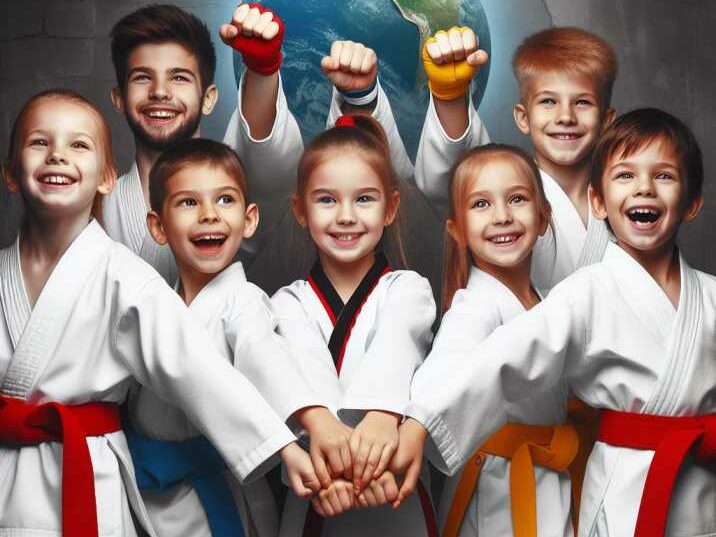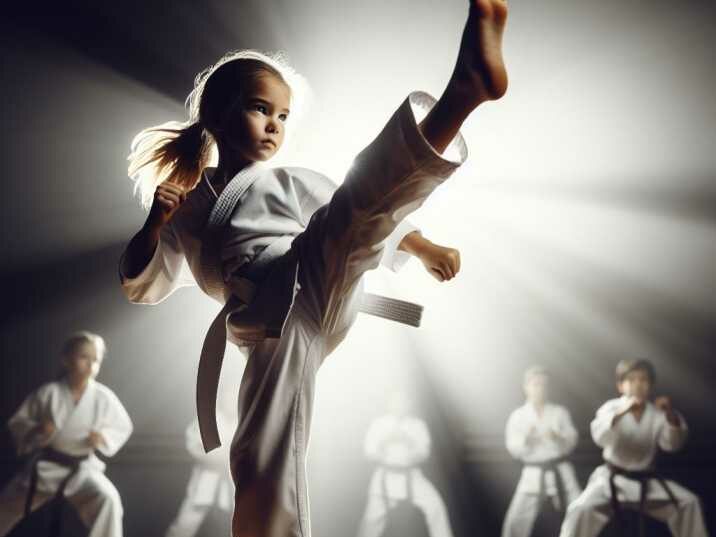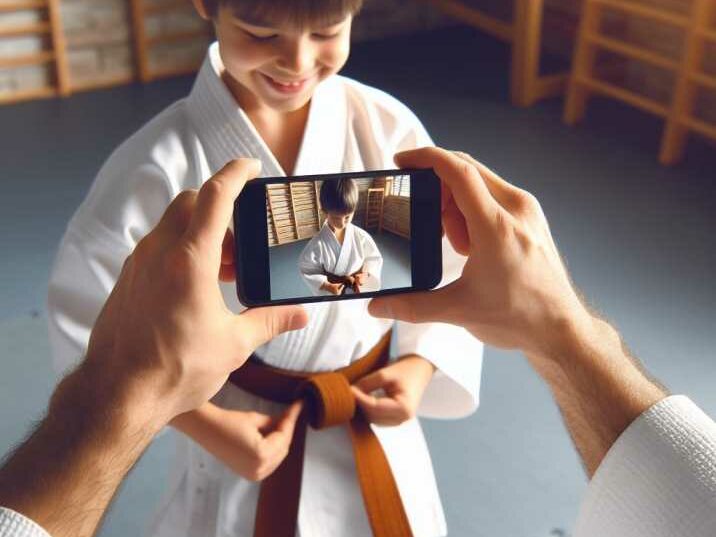Introduction
Table of Contents
In the fast-paced digital age, parents are constantly seeking activities that not only keep their kids physically active but also contribute to their holistic development. Martial arts emerges as a powerhouse in this context, offering a myriad of benefits that extend beyond the confines of a training mat. In this comprehensive exploration, we delve into the unique advantages that martial arts bring to the table for children.here are 10 Empowering Benefits of Martial Arts for Kids.

Benefits of Martial Arts for Kids
1: Physical Fitness Redefined:
Martial arts is not just about mastering punches and kicks; it’s a full-body workout that engages muscles and enhances cardiovascular health. Through a combination of drills, forms, and sparring, kids develop agility, strength, and flexibility. This physical foundation not only sets the stage for a healthy lifestyle but also provides a solid base for other physical activities.

2: Discipline as a Way of Life:
One of the cornerstones of martial arts is discipline. Kids enrolled in martial arts classes quickly learn the importance of respect, punctuality, and self-control. The structured nature of training sessions instills a sense of responsibility, reflecting positively on their behavior in and out of the dojo. These early lessons in discipline often translate into better academic performance and improved social interactions.
3: Building Confidence Brick by Brick:
As kids progress through the ranks in martial arts, they earn belts, each symbolic of their achievements and growth. This tangible recognition fosters a sense of accomplishment and boosts self-esteem. Confidence gained in the dojo frequently spills over into other areas of a child’s life, encouraging a positive self-image and the courage to tackle challenges head-on.
4: Respect in Action:
Respect is a fundamental aspect of martial arts training. Children learn to bow to their instructors and partners, emphasizing the importance of treating others with courtesy and consideration. This culture of respect extends beyond the training mat, positively influencing how kids interact with teachers, peers, and family members.
5: Conflict Resolution Skills:
Martial arts is not about promoting aggression; rather, it teaches kids how to manage conflicts in a controlled and non-violent manner. Techniques learned in the dojo emphasize redirecting energy and diffusing tense situations, providing valuable life skills that extend far beyond the martial arts setting.
6: Sharper Focus, Better Grades:
The concentration required in martial arts training has a direct impact on a child’s ability to focus. Techniques demand precision, and forms require memorization, honing a child’s attention span. This improved concentration often translates into academic success, as kids become more adept at focusing on tasks and absorbing information in the classroom.
7: Goal Setting and Achieving:
Martial arts introduces children to the concept of setting and achieving goals. The belt system, with its progressive levels, serves as a roadmap for advancement. As kids work towards earning higher belts, they learn the value of persistence, dedication, and the sweet taste of success when goals are accomplished.

8: Stress Reduction through Movement:
In a world where stress is increasingly prevalent, the physical activity involved in martial arts serves as a powerful stress reliever for kids. The controlled release of energy during training sessions helps reduce tension, promoting emotional well-being. Kids learn to channel their emotions constructively, creating a healthy outlet for stress and frustration.
9: Teamwork and Camaraderie:
While martial arts often involve individual training, many classes incorporate group activities and partner exercises. This fosters a sense of teamwork and camaraderie among kids. Learning to work together not only enhances their social skills but also lays the groundwork for the development of meaningful friendships.
10: Cultural Awareness and Diversity:
Many martial arts have deep cultural roots, originating from various parts of the world. Engaging in martial arts provides an opportunity for kids to learn about different cultures, traditions, and histories. This exposure enhances their cultural awareness, promoting a sense of respect for diversity and global understanding.
11: Self-Defense Skills for Empowerment:
While the primary focus of martial arts is on non-violent conflict resolution, the practical self-defense skills taught can empower children. Knowing how to protect oneself instills a sense of confidence and assurance. Importantly, these skills are taught in a way that emphasizes responsibility and the importance of avoiding physical altercations whenever possible.
A Lifelong Journey:
conclusion
Martial arts for kids is not just a phase; it’s a journey that can shape their character and contribute to their overall well-being. The benefits of martial arts for kids extend far beyond the physical, encompassing mental, emotional, and social aspects of a child’s development.
In conclusion, enrolling your child in martial arts is a holistic investment in their future. The discipline, confidence, and life skills acquired on the training mat can positively influence their academic achievements, social interactions, and personal growth. As we witness the transformative power of martial arts in children, it becomes clear that the benefits extend well beyond the kicks and punches, unlocking a world of potential for the young practitioners.

Frequently asked questions (FAQS)
- Q: At what age can my child start learning martial arts?
- A: Many martial arts schools accept children as young as 4 or 5 years old. It’s best to check with specific schools to find age-appropriate programs.
- Q: How does martial arts promote discipline in kids?
- A: Martial arts instills discipline through structured training, emphasizing respect for instructors, adherence to rules, and the development of self-control.
- Q: Will my child become aggressive by learning martial arts?
- A: No, martial arts teaches self-discipline and control. Children learn to use their skills responsibly and avoid conflicts whenever possible.
- Q: What types of martial arts are suitable for kids?
- A: Many martial arts, such as Karate, Taekwondo, and Judo, have specialized programs for children, focusing on skill development and character building.
- Q: How does martial arts help in academic performance?
- A: Martial arts improves focus, concentration, and goal-setting skills, which can positively impact a child’s academic achievements.
- Q: Is martial arts only for physically active kids?
- A: Martial arts caters to various fitness levels. It helps improve physical fitness, but it’s also suitable for children looking to enhance discipline, confidence, and focus.
- Q: Can my child learn self-defense through martial arts?
- A: Yes, martial arts teaches practical self-defense techniques, emphasizing responsibility and the importance of avoiding physical altercations.
- Q: How does martial arts contribute to mental well-being?
- A: The physical activity in martial arts releases stress, and the discipline instills a positive mindset, contributing to a child’s overall mental well-being.
- Q: Are there cultural aspects to martial arts that my child will learn?
- A: Many martial arts have deep cultural roots. Children often learn about traditions, history, and values associated with the martial art they study.
- Q: Is martial arts suitable for children with special needs?
- A: Yes, many martial arts schools offer inclusive programs and adapt training to accommodate children with special needs, promoting inclusivity and physical activity.


